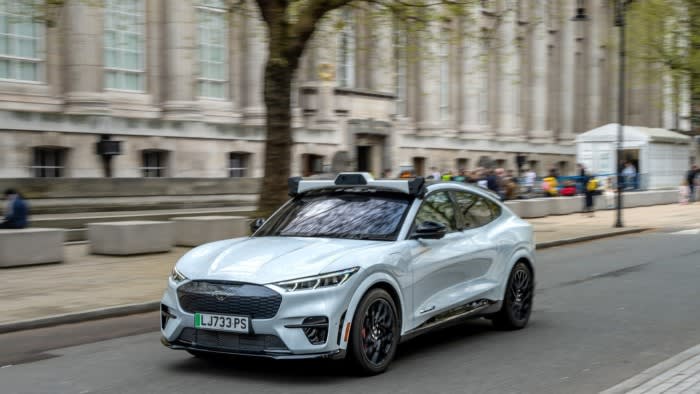SoftBank leads $1bn funding for UK artificial intelligence group Wayve

Unlock the Editor’s Digest for free
Roula Khalaf, Editor of the FT, selects her favourite stories in this weekly newsletter.
Japanese conglomerate SoftBank is leading an investment of more than $1bn into UK self-driving car start-up Wayve, marking Europe’s largest artificial intelligence deal to date.
The funding round, which also includes Nvidia and existing investor Microsoft, will allow the London-based company to deploy its autonomous systems in cars in the coming years.
Wayve’s new financing is the largest for a European AI start-up, after France-based Mistral raised $415mn in December and Germany’s Aleph Alpha raised $500mn in November.
The deal is significant for the UK, which has ambitions of being a global hub of AI research and expertise but has largely failed to grow or retain its most promising companies in the field.
Prime Minister Rishi Sunak said the deal “anchors the UK’s position as an AI superpower”, adding that “the fact that a homegrown, British business has secured the biggest investment yet in a UK AI company is a testament to our leadership in this industry”.
It also confirms SoftBank chief executive Masayoshi Son’s renewed hunt for AI investments with leading start-ups, having previously been slow to deploy capital in the sector compared with rivals, and comes as analysts speculate that he might be working on larger deals.
Wayve, founded in 2017, has developed an AI system that allows vehicles to learn while driving, avoiding the need for costly mapping and expensive laser-based sensors, and potentially allowing self-driving cars to launch in new areas faster and at a lower cost than larger US rivals such as Alphabet’s Waymo.
The company is in talks with several carmakers about using its systems, rather than planning to launch its own fleet of vehicles, in coming years.
Wayve hopes to expand its technology from cars to other kinds of robots, describing its approach as “embodied AI” in contrast to online-only chatbots such as OpenAI’s ChatGPT.
Kentaro Matsui, head of new business at SoftBank and a managing partner in its Vision Fund, said Wayve was taking a “very sensible, feet-on-the-ground strategy”.
Matsui added that it took roughly 18 months from the point Vision Fund met Wayve to formal investment decisions being made. The money, however, is coming from SoftBank, rather than its Vision Funds. Another person familiar with the matter said SoftBank was putting up the substantial majority of the $1.05bn funding round.
The deal is among the most significant involving British AI companies since 2014, when Google acquired UK start-up DeepMind, founded by Sir Demis Hassabis, a unit that has become crucial in the Silicon Valley giant’s development of the cutting-edge technology.
“Wayve is probably the most advanced embodied AI company in the world and it’s here in Britain,” said Suranga Chandratillake, a partner at Balderton Capital, an investor in the company. He added that the start-up provided a “really important foot in the door” for the UK in an increasingly geopolitical race to dominate the next era of computing.
However, there have been doubts about the deployment of self-driving technology in cars, with a number of high-profile accidents and the industry split over its approach.
Tesla, which takes a similar approach to Wayve, has become notorious for chief executive Elon Musk’s overly optimistic predictions of its vehicles’ self-driving capabilities in recent years. But the electric-car maker has increasingly focused on AI in plans to launch so-called robotaxis later this year.
Pooling learning from different types of vehicles all over the world rather than “one constrained city with one type of vehicle” allows Wayve’s system to replicate realistic driving behaviour while still obeying rules of the road, said Alex Kendall, co-founder and chief executive.
At present Wayve offers so-called Level 2 automation, which allows for partial autonomous driving and which SoftBank’s Matsui described as “eyes on, hands off”.
During a demonstration to the Financial Times last week in London, a car running Wayve’s first-generation technology felt smooth and natural. It was able to overtake stopped buses, navigate temporary roadworks with unmarked narrow lanes, and leave space for pedestrians climbing out of a parked car while avoiding an oncoming vehicle.
Only once during the 40-minute test ride, when a large van refused to give way during a lane merging, did a safety driver intervene with braking and steering.
“With the feedback from the car manufacturers, we believe that this is going to be a category-defining company,” said Brent Hoberman, whose Firstminute Capital fund is an early investor in Wayve.



